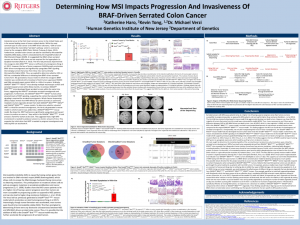Haro, Katherine: Determining How MSI Impacts Progression And Invasiveness Of BRAF-Driven Serrated Colon Cancer
Title: Determining How MSI Impacts Progression And Invasiveness Of BRAF-Driven Serrated Colon Cancer
Name: Katherine Haro
Major: Genetics
School affiliation: School of Arts and Sciences
Programs: Human Genetics Institute of New Jersey MacMillan Cancer Genetics Summer Undergraduate Research Fellowship (HGI-SURF)
Other contributors: Kevin Tong, Michael Verzi
Abstract: Colorectal cancer is the third most common cancer in the United States and is the second leading cause of cancer-related deaths. While the most common type of colon cancer is the WNT-driven adenoma, ~20% of colon cancers follow the more lethal “serrated” pathway -which is commonly driven by the oncogene BRAF (Patai, Molnár, Tulassay, & Sipos, 2013). Furthermore, serrated colon cancers can also be classified by Microsatellite Instability (MSI) status, which is characterized by the impaired function of DNA Mismatch Repair (MMR). It is suggested that BRAF-driven serrated cancers are driven by MSI status and are required for the hyperplasia- to-dysplasia transition (Rad et al. 2013). The Verzi lab previously reported that the oncogenic allele BRAFV600E/+ alone is inefficient at tumorigenesis (Tong et al. 2017). However, the loss of tumor suppressor SMAD4 greatly accelerates BRAF-driven tumorigenesis and significantly upregulates WNT signaling. Interestingly, tumors that arose from these mice were primarily Microsatellite Stable (MSS). Thus, we wanted to determine whether MSS or MSI has a substantial difference in dictating how BRAF-driven serrated tumors form. We generated a mouse model in which the oncogenic BRAF mutation was combined with a knockout of both tumor suppressor SMAD4 and DNA mismatch repair protein MSH2 in a Villin-Cre system. Strikingly, SMAD4KO BRAFV600E/+ MSH2KO mice develop multiple macroscopic tumors and serrated invasive tumors within three months. In contrast, SMAD4KO BRAFV600E/+ mice developed fewer serrated tumors within the same time frame, suggesting that MSH2KO accelerates serrated tumorigenesis and progression. Furthermore, the SMAD4KO BRAFV600E/+ MSH2KO tumors show elevated levels of WNT signaling, supporting the notion that elevated WNT signaling is required for serrated tumorigenesis. Whole Exome Sequencing (WES) analysis reveals that WNT-effector β-catenin (Ctnnb1) is commonly mutated in tumor organoids derived from both SMAD4KO BRAFV600E/+ MSH2KO and SMAD4KO BRAFV600E/+ mouse models. To determine whether elevated WNT is critical for serrated tumorigenesis, the Verzi Lab generated a mouse model in which β-catenin was added into a SMAD4KO BRAFV600E/+ mouse model. By doing this, WNT had become significantly upregulated and caused tumors to produce as soon as 7 days while in the SMAD4KO BRAFV600E/+ it took at least 1 month for tumors to be seen. This suggested that a high WNT environment is needed to produce tumors in a shorter amount of time. This supports the initial claim that WNT is needed to progress tumorigenesis and inducing MSI can accelerate it.
